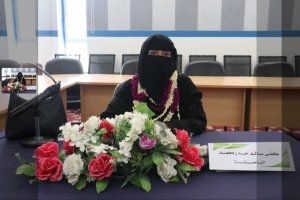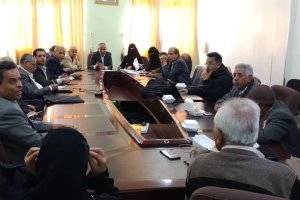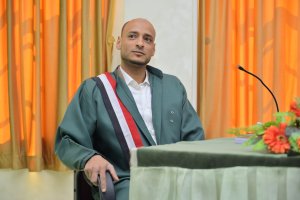Faculty of Arts & Humanities Awards Researcher Abdulwali Al-Shamiri PhD in Sociology
- Categories Letters and Promotions - Graduate Studies, news, Regulations - Postgraduate Studies
- Date April 23, 2025

Mr. Abdulwali Hazem Mohammed Redman Al-Shamiri has successfully defended his doctoral dissertation and been awarded a PhD in Sociology, majoring in Political Sociology, by Faculty of Arts & Humanities – Sana’a University. His dissertation, titled “Dependency and the Challenge of State Building in Developing Countries: Yemen as a Case Study,” was defended on Tuesday, Shawwal 24, 1446 Hijri, corresponding to April 22, 2025.
The viva-voce committee comprised the following distinguished scholars:
- External Examiner: Prof. Abdulsalam Ahmed Al-Dar, Taiz University, Member
- Main Supervisor: Prof. Abdullah Muqbel Moammer, Sana’a University, Member
- Internal Examiner and Chairperson: Prof. Hamoud Saleh Al-Aoudi, Sana’a University, Chairperson
The dissertation aimed to:
Elucidate the concept of dependency, its various dimensions, mechanisms, and underlying theories. It also sought to clarify the notion of state-building, its explanatory theories, and indicators, while highlighting the impacts of dependency on the state-building process in developing countries in general and Yemen in particular.
The researcher’s dissertation yielded several significant findings, most notably:
- The emergence of the centralized state – in the sense of a central authority governing a specific territory and managing its affairs – in developing countries dates back to over four thousand years BC. The nature of state-building varies over time depending on the prevailing circumstances in each era.
- Dependency on Western influence originated and evolved with the rise and development of the global capitalist system in the 16th century.
- Dependency is a unified and integrated system of interconnected political, economic, cultural, and social relations and structures. It manifests in various forms, including internal and external dependency, political, economic, cultural, and military dependency. The degree of dependency varies from one country to another based on several factors, including the foundations of state-building, economic and financial status, and the nature of the ruling regime and political leadership in each country.
- Dependency cannot be established without support from local actors who benefit from this reality.
- Dependency has played a significant role in hindering state-building in developing countries.
- Political and social forces have consistently differed and have been unable to achieve consensus or a clear common ground regarding the ideology of the state to be built.
The researcher also presented several recommendations, including:
- Prioritizing nation-building before state-building.
- The necessity of reviewing the state-building strategy in light of new global changes to ensure it meets the aspirations and needs of the people. This requires formulating a new cultural model based on collective consciousness and ending wars, conflicts, and acts of violence.
- Reconsidering many political institutions and striving for reform by expanding participation, adopting Shura (consultation) programs, and allowing controlled freedom of expression to achieve political, economic, and social stability, thereby warding off the specter of intervention by global powers coveting the nation’s wealth and resources.
The viva voce was attended by a number of academics, scholars, researchers, students, the researcher’s colleagues, and family members.
Previous post
The Graduate Studies Council Holds Its 10th Meeting for the 2024/2025 Academic Year
You may also like






